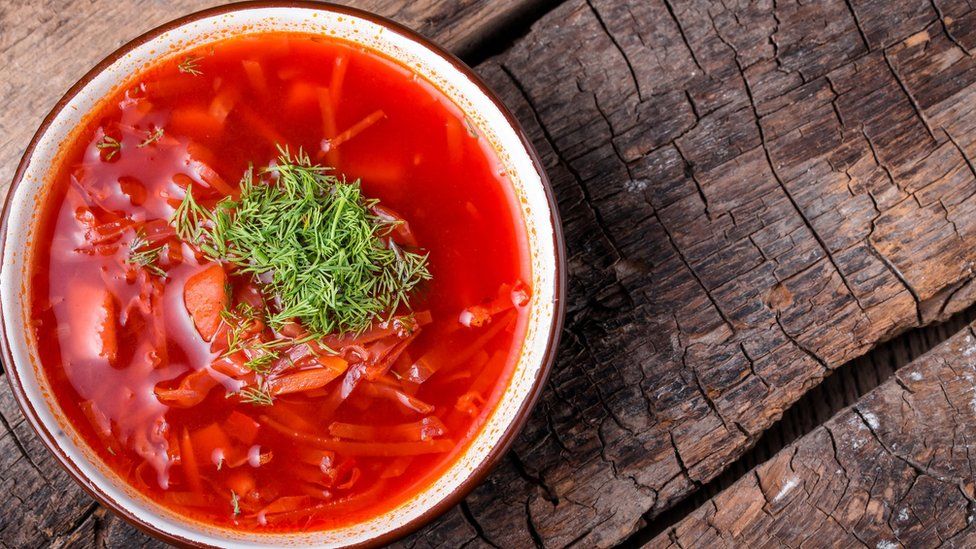Borsch soup in Ukraine added to Unesco endangered heritage list
- Published

The UN's cultural agency has added the cooking of borsch - a soup usually made with beetroot and potatoes - in Ukraine to its list of endangered intangible cultural heritage.
Unesco said the war in Ukraine had "threatened" the cooking of borsch.
"Victory in the war for borsch is ours!" Ukraine's Culture Minister Oleksandr Tkachenko said.
Russia's foreign ministry ridiculed the move stating that Russia's version of the dish has no need of safeguarding.
Borsch is a hearty soup, usually coloured red from beetroot - though green and white varieties also exist.
While Ukraine considers borsch to be its national dish, it is also widely consumed in Russia, other ex-Soviet countries and Poland. As a result, its origins are contentious.
There are many competing claims as to where the dish originates from, how the dish's name should be spelled, whether it includes meat or not, and even whether sour cream should be included on top of the soup or not.
In recent years, its status as a Ukrainian or Russian dish has been debated ferociously on social media, leading to an intensification of what some have labelled the "borsch wars".
In 2020, Ukraine applied to have the culture of cooking the dish added to Unesco's list of endangered cultural heritage and the decision of adding it to the list was due to be made in 2023.
But the decision-making process was fast-tracked due to Russia's invasion of Ukraine and the "negative impact" on the tradition of the dish, Unesco said in a press release.
Allow Twitter content?
This article contains content provided by Twitter. We ask for your permission before anything is loaded, as they may be using cookies and other technologies. You may want to read Twitter’s cookie policy, external and privacy policy, external before accepting. To view this content choose ‘accept and continue’.
"The armed conflict has threatened the viability of the element... as people are unable not only to cook or grow local vegetables" for the dish, "but also to come together to practice the element, which undermines the social and cultural well-being of communities".
"We will win both in the war of borsch and in this war," said Mr Tkachenko reacting to the news.
"We will happily share borsch and its recipes with all civilised countries. And with uncivilised ones too, so that they have at least something good, tasty and Ukrainian," he added.
Russian foreign ministry spokeswoman Maria Zakharova ridiculed the move. "Our borsch has no need of safeguarding but should be subject to immediate and complete destruction on the plate," she wrote on Telegram.
"Humus and plov (pilau) have been declared the national dishes of several nations. But as I understand it everything is subject to Ukrainisation. What's next? Will pork now be declared a Ukrainian national food?"
Beauty in versatility
British writer Lesley Chamberlain has written about borsch in her book The Food and Cooking of Russia.
Speaking to the BBC, she said borsch was a "spectacular" soup with "fantastic depth of flavour" and a "deep red colour".
"It can be so versatile, made in summer or winter, and it can be based on a vegetable or a meat stock."
Speaking about its origins, she said that while the dish was "terribly important to the Ukrainians, the food itself doesn't fit in with particular geographical boundaries".
"Its home lies in a large area of Eastern Europe," she said.